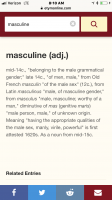x-ray peat
Member
- Joined
- Dec 8, 2016
- Messages
- 2,343
You will without a doubt vehemently disagree, and I don't wish to see your head explode in saying the following, but regarding Islam, I also see it as a vehicle of divine revelation, just like Judaism and Christianity, so for me at least, it's not extraneous to bring up.
Just as Christianity takes from Judaism themes/doctrines that it emphasizes more, shifts other themes to places of lesser, little or no importance, while adding brand new elements, above all the idea of God as man, the monotheistic God-man (1), Islam does the same with Judaism and Christianity. Islam brings back God's transcendence - and that's prominent theme in Judaism, it restores the place of Law in its own context with sharia (thus bringing back another Jewish strength), and replaces the God-man identity of Jesus with the identity of a major prophet (2), something that could easily come out of Judaism. At the same time, Islam maintains and preserves God's immanence, a very major Christian focus, but in a new way, without the need for a priesthood to undertake the complex theological acrobatics (which cannot be done relying on the OT alone, they required the Greek philosophy for this) needed to makes sense of the enigmatic "mystery" of God and man as one in Jesus. Islam directs their believers to the Koran as both the location and conduit of Divine Revelation which any Muslim believer can access and personally draw on, without mediation of a priestly or ecclesiastical machinery (both problematic impediments, salvifically speaking, in Judaism and Christianity). Islam, by minimizing or radically reducing he role of priestly/ecclesiastical machinery, universalizes access to salvation to an even greater magnitude than Christianity. (3) The Koran in Islam is functionally equivalent to Jesus in Christianity, just as Jesus in Christianity is functionally equivalent to the Koran in Islam.
From all the above, it may become clear that Islam is a "correction," so to speak, of the imbalances and excesses that inevitably developed in Judaism and Christianity. It fuses the best from Judaism and Christianity in proper proportion and values those fused or connected elements to the proper degree. At least in principle, and sometimes in practice, as with the earliest Muslims, and especially among the Sufis since then.
If Judaism corrects and adds something new to paganism, and Christianity corrects and adds something new to Judaism, then, in this developmental scheme, Islam corrects and balances out and adds something new to paganism, Judaism and Christianity. A very different version of what Christians call "salvific history," eh?
(1) BTW, you are incorrect in saying the NT gets everything it has from the OT. No it doesn't. There's nothing in the OT that indicates God is or could be a human being. The NT - or the way it gets interpreted and understood by Christians even then and later - gets any such notions from the Greeks. Ordinary, pious Jews at an earlier time, a little more than two centuries before say, who had little or no contact with Greek ideas, would be in principle fine referring to him as a human messiah, but to say some blue-collar working-class carpenter called Jesus is God Himself, in entirety, walking around on the earth? No, relatively earlier pious Jews would have been shocked by that as blasphemy, it would have reverberated with abundant pagan resonances to their ears.
(2) And as we know, Muhammad for Muslims, unlike Jesus for Christians, is NOT a God-Man, he is strictly a human and a prophet, a messenger.
(3) Protestantism registers the "Muslim impulse," so to speak, within Christianity to increase salvific universalism by ditching that machinery, but it does so at the cost of watering down the coherence of the Christian message, and above all, at the cost of destroying the unity of the Christian community, which splinters and fragments into hundreds or thousands of little - and often warring - sects that absolutize a few facets from the whole of that message. Extreme imbalances and ever-increasing cumulative confusion comes in the wake of Protestant Christianity. Instead of taking the escape hatch from this into say, Islam, the western world has chosen to take the fork in the road of secularism, nihilism and Dostoyevskian "If there is no God, everything is permitted" political replacements for religion, such as Marxism or Nazism.
Well my head didn’t explode, but it did shake back and forth quite a bit. The idea that “Islam is a correction” to the “the imbalances and excesses” of Christianity and Judaism is probably quite popular in academia but I suspect a left wing anti- Judaeo-Christian politics are at work. To me this claim is predicated upon using an archaic version of Judaism and an idealized one of Islam. A fair comparison would look at each religion during the same time periods, such as comparing the Priestly Theocracy to the pagan world of human sacrifice and idolatry. Or 7th century Rabbinical Judaism to 7th Century Islam. Judaism hasn’t had a Priesthood for 2,000 years and I would argue that it has corrected itself much farther than has Islam. With that line of thinking, Mormonism and Santeria, could be argued as corrections to Christianity.
Looking realistically at the three religions, both Judaism and Christianity have undergone major reformations as the needs of people and civilization have evolved. By contrast, an Islamic reformation is long overdue. An opinion held by many in Islam. As an example, the Talmud stated 2,000 years ago that a Sanhedrin that executes one person in seven years is considered bloodthirsty. Christianity stopped killing heretics with the ending of the Inquisitions and the religious wars of Europe. The same can’t be said for Islam. Public executions, corporal punishment, and lengthy imprisonment for the smallest infractions are all commonplace in the Muslim world.
Spoke too soon, your last paragraph almost made my head explode. Islam is not the “escape hatch”.
And to clarify, from a Christian perspective the OT does prophesize the coming of a God-Man Messiah; born of a virgin who will establish an everlasting Kingdom that he will rule forever. The Jews of course have a different interpretation and believe in an anointed man imbued with the Spirit of God.
Last edited:


